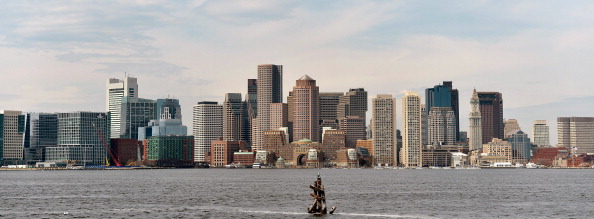In deciding Thursday which city it wanted to put forward for the 2024 Summer Games, there were many considerations the U.S. Olympic Committee had to take into account. Ultimately, though, only one truly mattered: the USOC is in it to win it. It picked Boston.
Nearly two years ago, the USOC started with roughly three dozen cities. It winnowed that many to four: Boston, Washington, Los Angeles and San Francisco. All along, the Boston plan — despite vocal local opposition and uncertainties about basics such as an Olympic stadium — captured the imagination of USOC leadership and staff.
To hear the USOC tell it Thursday after the announcement was made following a board of directors meeting at the Denver airport, they are, well, excited to get this show on the road:

“We’re excited about our plans to submit a bid for the 2024 Games and feel we have an incredibly strong partner in Boston that will work with us to present a compelling bid,” USOC chairman Larry Probst said in a statement.
Chief executive Scott Blackmun said the USOC “couldn’t be more excited about the partnership we’ve established with the leadership team in Boston,” including bid leader John Fish and the mayor, Marty Walsh.
“I couldn’t be more excited to share Boston’s athlete-focused vision for the Games with my IOC colleagues,” the former ice hockey star Angela Ruggiero said.
The Olympics tell us about which direction our world is headed, and that direction — for all the IOC’s Eurocentric tradition — increasingly has been looking at and across the Pacific.
Of course the 2012 Summer Games were in London, the 2014 Winter Games were in Sochi, the 2016 Summer Games will be in Rio. There are others elsewhere, too: the 2018 Youth Games, for instance, will be in Buenos Aires.
But consider:
The 2008 Summer Games, Beijing; 2010 Winter, Vancouver; 2010 Youth Games, Singapore; 2014 Youth Games, Nanjing; 2018 Winter, Pyeonghang, South Korea; 2020 Summer, Tokyo; 2022, Almaty, Kazakhstan, or Beijing.
What the USOC rolled the dice on Thursday for 2024, with the choice of Boston, is that the IOC wants not only to come back to the United States but to the East Coast, instead of to San Francisco or Los Angeles, which look out across that very Pacific.
DC, and paying due respect to the energy, enthusiasm and leadership of businessmen Russ Ramsey and Ted Leonsis as well as the input of the likes of former NFL commissioner Paul Tagliabue, was always going to be DOA. Can you say, for instance, CIA? How about that torture report a few weeks back?
Just imagine a two-year bid campaign chock full of headlines blaring “torture,” amplifying the role of the United States of America in overseas adventures. Not to mention the “oversight” of 535 self-appointed know-it-alls, each of the members of Congress. In the IOC, moreover, there are those who well remember the former president, Juan Antonio Samaranch, essentially being hauled before Congress to testify at the height of the late 1990s Salt Lake City crisis.
San Francisco?
There, the IOC would have had the advantage of being able to show off the five rings on the Golden Gate and Bay Bridges. Beautiful, for sure.
But as the New York Times pointed out in a story this week, who wants to go to San Francisco for the complexities of a Summer Games when something seemingly as simple as improving four grass soccer fields last year was met with litigation, protests and a ballot measure?
Plus, there are those in the IOC who remember, too, that the 2008 Beijing torch relay in San Francisco was met with — and had to be dead-ended on the approach to that very same Golden Gate Bridge because of — protests.
Los Angeles made an extraordinary series of presentations to the USOC. And bid leader Casey Wasserman and the mayor, Eric Garcetti, fluent in Spanish, were viewed as stars-in-the-making.
For all that, and for all that is going on in downtown LA — now unequivocally hipster central — the USOC could not, in many conversations with IOC members, apparently get past a “been there, done that” vibe from 1984.
How that jibes with, for instance, London (2012 Games a third time) or Beijing (a 2022 Winter bid favorite, not even seven years after the close of the 2008 Summer Games): unclear.
At any rate, it all pointed to Boston.
The IOC is said to be intrigued by the more than 100 universities in and around Boston, which would be used to house events and athletes. That’s the age demographic the IOC is after, big time.
The Boston plan also features significant numbers of temporary venues. That’s a key feature of “Agenda 2020,” the 40-point plan the IOC membership enacted at a meeting last month in Monaco.
The good news about Boston: it’s a blank slate for many in the IOC.
Boston’s reputation for great sports is, let’s remember, within the United States; that reputation is grossly inflated by ESPN’s incessant showing of Red Sox games and the fact that Tom Brady and the Patriots are on TV seemingly every weekend from September until January.
All that means little to nothing outside the continental 48 states. Brady? Does he play soccer? The Red Sox — overseas, that whole 2004 thing and the 86-year-curse might as well be the far side of the moon. Remember, too: baseball is on the outside of the Olympics trying to get back in.
The USOC, and its new Boston partners, face — let’s be real — a sales job.
The upside: the USOC, and its new Boston friends, get to come up with a story, a compelling narrative, about why Boston, and why the United States for 2024.
Not to say it can’t be done. Or that there are forces that may already want the USOC to prevail.
You don’t think so?
So curious that IOC president Thomas Bach’s op-ed entitled “A New Olympics,” which relayed the highlights of Agenda 2020, ran Tuesday in the Boston Globe, and only in the Boston paper.
Not in the San Francisco Chronicle, or the Washington Post, or the LA Times.
Or maybe that was just a coincidence.
Bids for 2024 are possible from Germany; from Paris; from Rome; and elsewhere.
You might have thought that, back in September, Boston 2024 bid leader Fish seemed to have committed campaign sin No. 1 when he told the Globe he “reckoned” the city’s odds of being named the U.S. entry were “75 percent based on the perceived reaction to Boston’s pitch to USOC officials,” adding, “I’m not in this to lose. I would never bet against myself.”
Over the past five-plus years, ever since Chicago’s 2009 debacle for 2016, the USOC public playbook has been humility and self-deprecating graciousness.
Apparently there was no public reckoning whatsoever.
The USOC is not in this to lose, either. Kudos, Mr. Fish. Congrats, Mayor Walsh.




